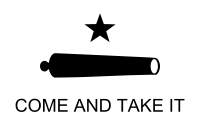Come and take it

"Come and take it" is a historic slogan, first used in the Battle of Thermopylae as "Molon labe", and later in 1778 at Fort Morris in the Province of Georgia during the American Revolutionary War, and in 1835 at the Battle of Gonzales during the Texas Revolution.
American Revolutionary War

Sunbury, Georgia, is now a ghost town, though in the past it was active as a port, located east of Hinesville. Fort Morris was constructed in Sunbury by the authority of the Continental Congress. A contingent of British soldiers attempted to take the fort on November 25, 1778. The American contingent at Fort Morris was led by Colonel John McIntosh (c. 1748-1826).[1] The Americans numbered only 127 Continental soldiers plus militiamen and local citizens. The fort itself was crudely constructed and could not have withstood any concerted attack.
The British commander, Colonel Fuser, demanded Fort Morris' surrender through a written note to the American rebels. Though clearly outnumbered (he had only about 200 men plus artillery), Colonel McIntosh's defiant written response to the British demand included the following line: "As to surrendering the fort, receive this laconic reply: COME AND TAKE IT!". The British declined to attack, in large part due to their lack of intelligence regarding other forces in the area. Colonel Fuser believed a recent skirmish in the area, combined with Colonel McIntosh's bravado, might have reflected reinforcements and so the British withdrew.
The British returned in January 1779 with a larger force. They later conquered and controlled nearly all of Georgia for the next few years.[2] Col. McIntosh's defiance was one successful and heroic event which inspired the patriots as the War moved to the Carolinas and then north.
The Fort Morris Historical Marker is on Martin Road, Midway, Georgia.[3] It is located at the visitor center for the Fort Morris Historic Site. The center is located off Fort Morris Road, at the end of the Colonels Island Highway (Georgia Route 38). The marker memorializes the battle and notes the "Come and Take It!" response.
In recognition of his valor of defending Fort Morris in Sunbury, McIntosh was awarded a sword by the Georgia Legislature with the words "Come and Take It" engraved on the blade.[4] McIntosh later served in the War of 1812 as an American General, still protecting the Georgia coast. He served honorably, receiving honors from the City of Savannah for his service.
Texas Revolution

In early January 1831, Green DeWitt wrote to Ramón Músquiz, the top political official of Bexar, and requested armament for defense of the colony of Gonzales. This request was granted by delivery of a small used cannon. The small bronze cannon was received by the colony and signed for on March 10, 1831, by James Tumlinson, Jr.[5] The swivel cannon was mounted to a blockhouse in Gonzales and later was the object of Texas pride. At the minor skirmish known as the Battle of Gonzales—the first battle of the Texas Revolution against Mexico—a small group of Texians successfully resisted the Mexican forces who had orders from Colonel Domingo de Ugartechea to seize their cannon. As a symbol of defiance, the Texians had fashioned a flag containing the phrase "come and take it" along with a black star and an image of the cannon that they had received four years earlier from Mexican officials. This was the same message that was sent to the Mexican government when they told the Texians to return the cannon; lack of compliance with the initial demands led to the failed attempt by the Mexican military to forcefully take back the cannon.[6]
Replicas of the original flag can be seen in the Texas State Capitol, the Bob Bullock Texas State History Museum, the Sam Houston State University CJ Center, the University of Texas at El Paso Library, the Marine Military Academy headquarters building, the Hockaday School Hoblitzelle Auditorium, and in Perkins Library at Duke University.

References
- ↑ GlynnGen.com Coastal Georgia Genealogy Page on John McIntosh
- ↑ North Georgia History
- ↑ "Fort Morris Marker". Hmdb.org. Retrieved March 2013. Check date values in:
|access-date=(help) - ↑ Lucien Lamar Knight, Georgia's Landmarks, Memorials, and Legends ...: Under the code duello... pages 500-501
- ↑ Lindley, Thomas Ricks, "GONZALES COME AND TAKE IT CANNON", Handbook of Texas Online, Texas State Historical Association, retrieved June 2012 Check date values in:
|access-date=(help) - ↑ "Come and Take It Cannon Exhibit". Gonzalesmemorialmuseum.com. Archived from the original on 2012-10-30. Retrieved March 2013. Check date values in:
|access-date=(help)
External links
- Gonzales "come and take it" cannon from the Handbook of Texas Online
- Gonzales Flag as designed in 1835